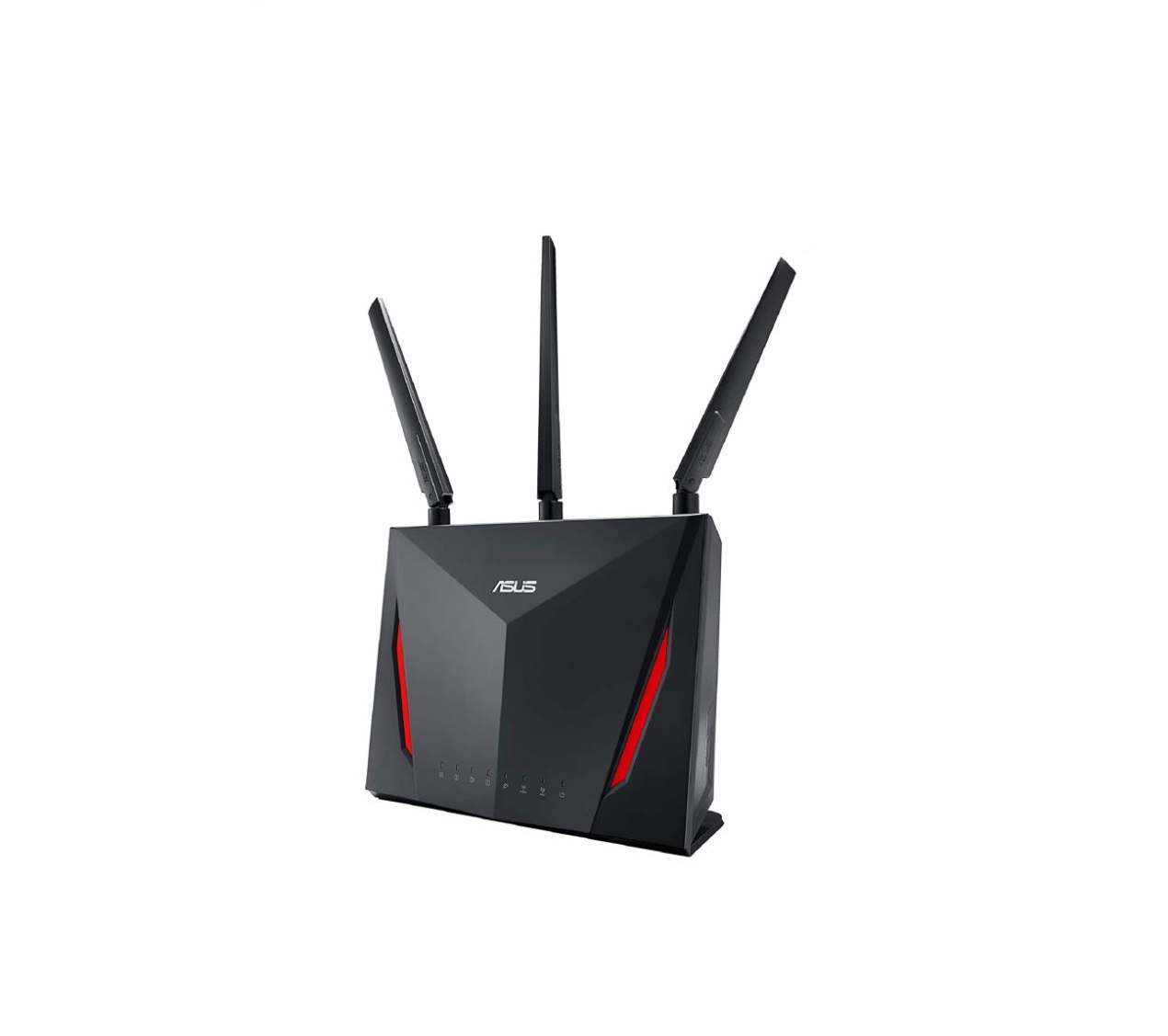ASUS Wireless-AC2900 Dual band Gigabit
Router User Guide
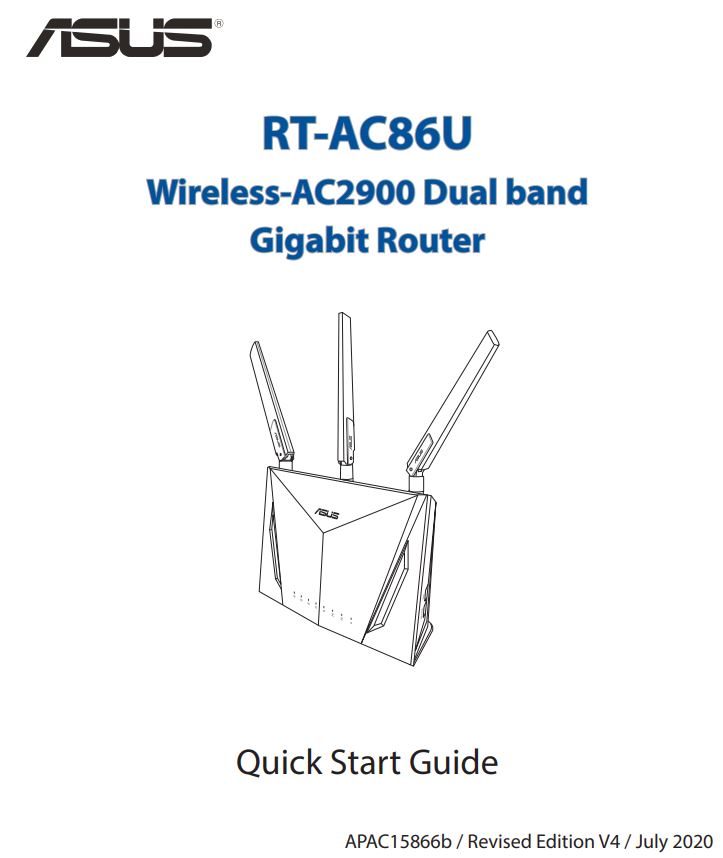
Package contents
- RT-AC86U Wireless Router
- AC adapter
- Quick Start Guide
- 3 * wireless antennas
- Network cable (RJ-45)
![]() NOTE: If any of the items are damaged or missing, contact your retailer.
NOTE: If any of the items are damaged or missing, contact your retailer.
A quick look at your router
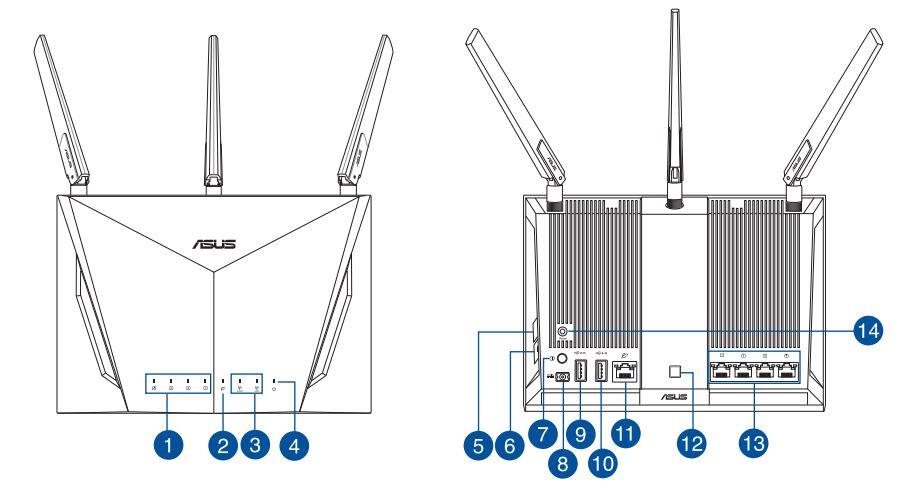
- LAN LED
- WAN (Internet) LED
- 2.4GHz / 5GHz Wi-Fi LED
- Power LED
- WPS button
- Wi-Fi On/Off button
- Power button
- Power (DC-IN) port
- USB 2.0 port
- USB 3.0 port
- WAN (Internet) port
- LED On/Off button
- LAN ports
- Reset button
Preparing your modem
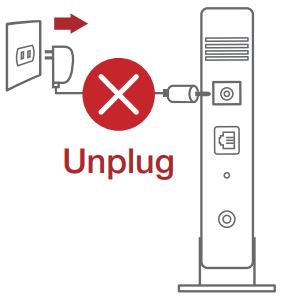 1. Unplug the power cable/DSL modem. If it has a battery backup, remove the battery.NOTE: If you are using DSL for the Internet, you will need your username/password from your Internet Service Provider (ISP) to properly configure the router.
1. Unplug the power cable/DSL modem. If it has a battery backup, remove the battery.NOTE: If you are using DSL for the Internet, you will need your username/password from your Internet Service Provider (ISP) to properly configure the router.
2. Connect your modem to the router with the bundled network cable.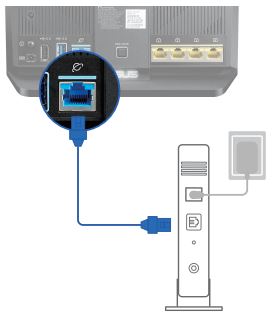
3. Power on your cable/DSL modem.4. Check your cable/DSL modem LED lights to ensure the connection is active.
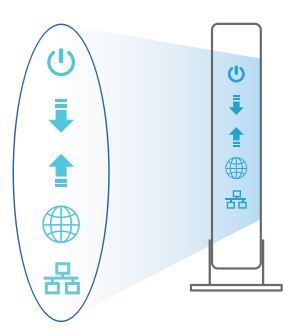
Setting up your router
You can set up your router via a wired or wireless connection.
A. Wired connection
1. Plug your router into a power outlet and power it on. Connect the network cable from your computer to a LAN port on your router.

NOTES:
- Use only the adapter that came with your package. Using other adapters may damage the device.
- Specifications:

2. The web GUI launches automatically when you open a web browser. If it does not auto-launch, enter http://router.asus.com3. Set up a password for your router to prevent unauthorized access.

B. Wireless connection
1. Plug your router into a power outlet and power it on.
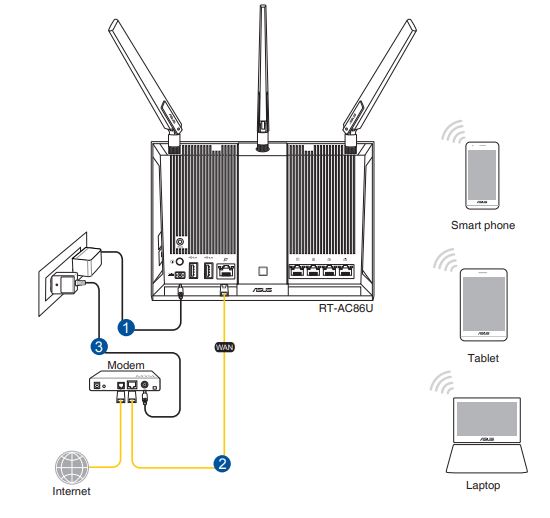

2. Connect to the network name(SSID) shown on the product label on the backside of the router. For better network security, change to a unique SSID and assign a password.


2.4G Wi-Fi Name (SSID): ASUS_XX_2G5G Wi-Fi Name (SSID): ASUS_XX_5G
* XX refers to the last two digits of the 2.4GHz MAC address. You can find it on the label on the back of your router.
3. Once connected, the web GUI launches automatically when you open a web browser. If it does not auto-launch, enter http://router.asus.com.4. Set up a password for your router to prevent unauthorized access.



Remembering your wireless router settings
- Remember your wireless settings as you complete the router setup.
Router Name:Password:
2.4 GHz network SSID:Password:
5GHz network SSID:Password:
FAQ
1. Where can I find more information about the wireless router?
- Online FAQ site: http://support.asus.com/faq
- Technical support site: http://support.asus.com
- Customer hotline: refer to the Support Hotline section in this Quick Start Guide
Networks Global Hotline Information
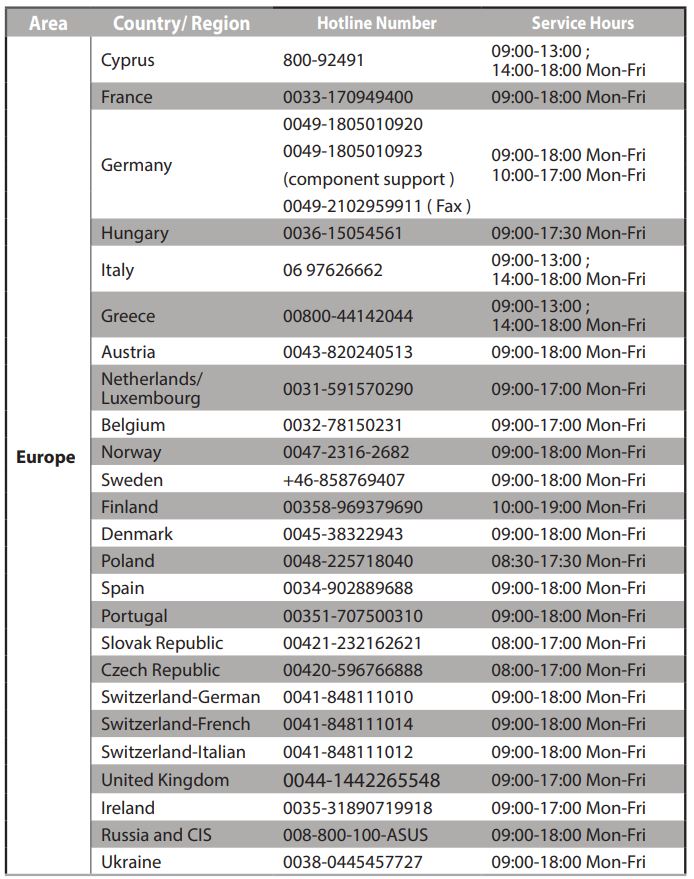

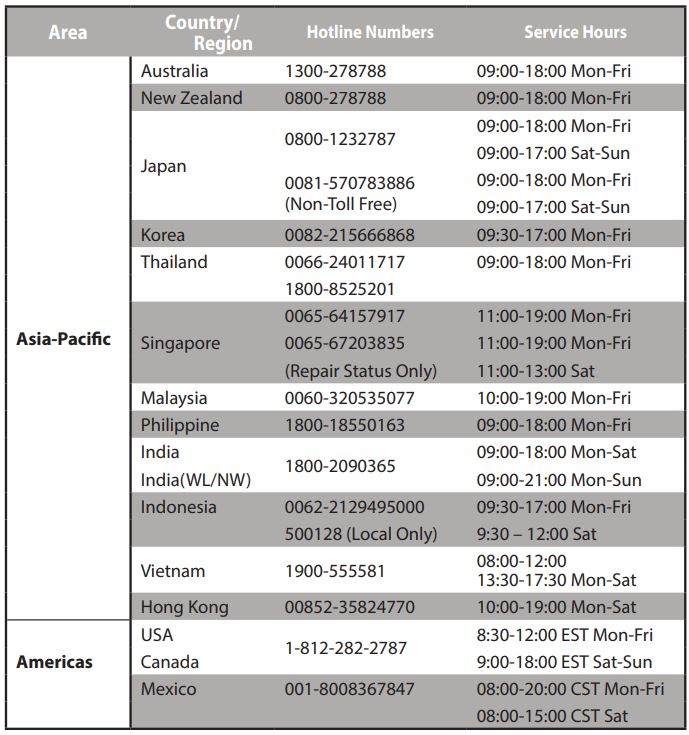

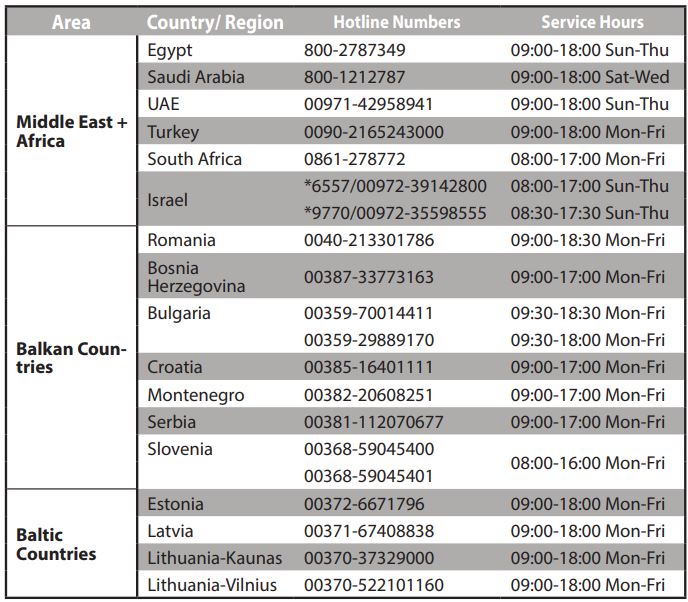

NOTES:
- UK support e-mail: [email protected]
- For more information, visit the ASUS support site at: http://support.asus.com
ASUS Recycling/Takeback ServicesASUS recycling and takeback programs come from our commitment to the highest standards for protecting our environment. We believe in providing solutions for you to be able to responsibly recycle our products, batteries, other components, as well as packaging materials. Please go to http://csr.asus.com/english/Takeback.htm for detailed recycling information in different regions.
REACHComplying with the REACH (Registration, Evaluation, Authorisation, and Restriction of Chemicals) regulatory framework, we published the chemical substances in our products on the ASUS REACH website at http://csr.asus.com/english/REACH.htm
Federal Communications Commission StatementThis device complies with Part 15 of the FCC Rules. Operation is subject to the following two conditions:
- This device may not cause harmful interference.
- This device must accept any interference received, including interference that may cause undesired operation.
This equipment has been tested and found to comply with the limits for a Class B digital device, pursuant to part 15 of the FCC Rules. These limits are designed to provide reasonable protection against harmful interference in a residential installation. This equipment generates, uses, and can radiate radio frequency energy and, if not installed and used in accordance with the instructions, may cause harmful interference to radio communications. However, there is no guarantee that interference will not occur in a particular installation. If this equipment does cause harmful interference to radio or television reception, which can be determined by turning the equipment off and on, the user is encouraged to try to correct the interference by one or more of the following measures:
- Reorient or relocate the receiving antenna.
- Increase the separation between the equipment and receiver.
- Connect the equipment into an outlet on a circuit different from that to which the receiver is connected.
- Consult the dealer or an experienced radio/TV technician for help.
![]()
![]()
![]()
IMPORTANT! This device within the 5.15 ~ 5.25 GHz is restricted to indoor operations to reduce any potential for harmful interference to co-channel MSS operations.
![]()
![]()
![]()
Prohibition of Co-locationThis device and its antenna(s) must not be co-located or operating in conjunction with any other antenna or transmitter.
IMPORTANT NOTE:Radiation Exposure Statement: This equipment complies with FCC radiation exposure limits set forth for an uncontrolled environment. End-users must follow the specific operating instructions for satisfying RF exposure compliance. To maintain compliance with FCC exposure compliance requirements, please follow operation instructions as documented in this manual.
Declaration of Conformity for R&TTE directive 1999/5/ECEssential requirements Article 3 Protection requirements for health and safety Article 3.1a Testing for electric safety according to EN 60950-1 has been conducted. These are considered relevant and sufficient. Protection requirements for electromagnetic compatibility Article 3.1b Testing for electromagnetic compatibility according to EN 301 489-1 and EN 301 489-17 has been conducted. These are considered relevant and sufficient. Effective use of the radio spectrum Article 3.2 Testing for radio test suites according to EN 300328 has been conducted. These are considered relevant and sufficient.
Declaration of Conformity for Ecodesign directive 2009/125/ECTesting for eco-design requirements according to (EC) No 1275/2008 and (EU) No 801/2013 has been conducted. When the device is in Networked Standby Mode, its I/O and network interface are in sleep mode and may not work properly. To wake up the device, press the WiFi on/off, LED on/off, reset, or WPS button.
CE Mark WarningThis is a Class B product, in a domestic environment, this product may cause radio interference, in which case the user may be required to take adequate measures. Operation Channels: CH1~11 for N. America; Ch1~13 for Japan; CH1~13 for Europe (ETSI) This equipment may be operated in AT, BE, CY, CZ, DK, EE, FI, FR, DE, GR, HU, IE, IT, LU, MT, NL, PL, PT, SK, SL, ES, SE, GB, IS, LI, NO, CH, BG, RO, RT.
Canada, Industry Canada (IC) NoticesThis Class B digital apparatus complies with Canadian ICES-003 and RSS-247. Operation is subject to the following two conditions: (1) this device may not cause interference, and (2) this device must accept any interference, including interference that may cause undesired operation of the device.
Radio Frequency (RF) Exposure InformationThe radiated output power of the ASUS Wireless Device is below the Industry Canada (IC) radio frequency exposure limits. The ASUS Wireless Device should be used in such a manner that the potential for human contact during normal operation is minimized.
This device has been evaluated for and shown compliant with the IC Specific Absorption Rate (“SAR”) limits when installed in specific host products operated in portable exposure conditions (antennas are less than 20 centimeters of a person’s body).
This device has been certified for use in Canada. Status of the listing in the Industry Canada’s REL (Radio Equipment List) can be found at the following web address: http://www.ic.gc.ca/app/sitt/reltel/srch/nwRdSrch.do?lang=eng
Additional Canadian information on RF exposure also can be found at the following web: http://www.ic.gc.ca/eic/site/smt-gst.nsf/eng/sf08792.html
Canada, avis d’Industrie Canada (IC)Cet appareil numérique de la classe B est conforme aux normes ICES-003 et RSS-247 du Canada. Son utilisation est sujette aux deux conditions suivantes : (1) cet appareil ne doit pas créer d’interférences et (2) cet appareil doit tolérer tout type d’interférences, y compris celles susceptibles de provoquer un fonctionnement non souhaité de l’appareil.
KC: Korea Warning Statement
Class B equipment (For Home Use Broadcasting & Communication Equipment)
This equipment is home use (Class B) electromagnetic wave suitability and to be used mainly at home and it can be used in all areas.
References
[xyz-ips snippet=”download-snippet”]

